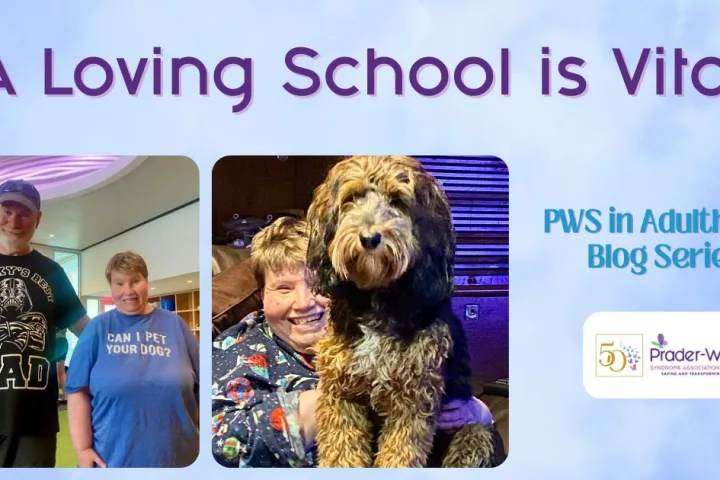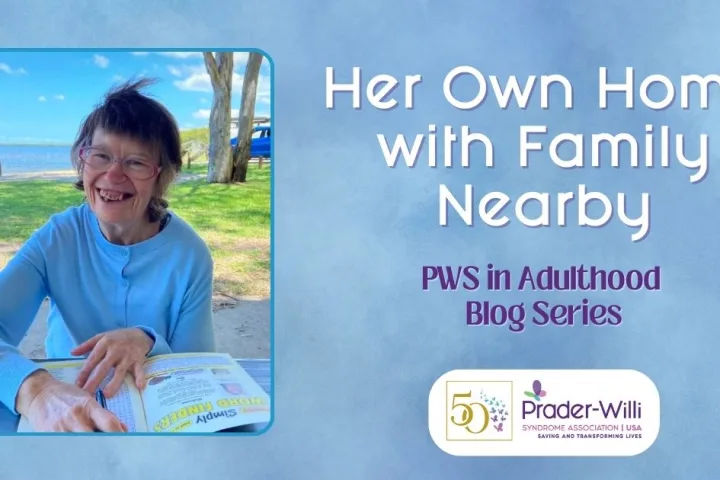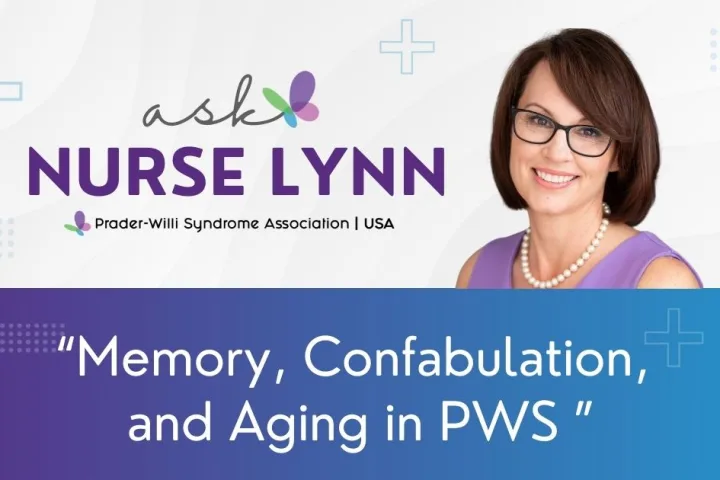This week, members of PWSA | USA’s Adults with Prader-Willi Syndrome (PWS) Advisory Board gathered in Phoenix, Arizona, for a multi-day meeting to discuss upcoming initiatives and programs. Among the key topics was planning for the Adults with PWS Conference, a half-day event that will take place during the 2025 International PWS Conference on June 26, 2025. During the gathering, advisory board members sat down for a candid interview with PWSA | USA’s CEO, Stacy Ward, to reflect on their experiences, challenges, and hopes for the future. The Adults with PWS Advisory Board is comprised of individuals living with PWS who are 18 years and older, and living in various U.S. states.
Current Advocacy Efforts: A Focus on Self-Advocacy and Representation
When asked about the initiatives they are working on, board members Shawn Cooper and Conor Heybach spoke about the importance of self-advocacy and raising awareness on a national level. “We went down to Washington, D.C., for the D.C. Fly-In to talk to our local representatives about what it’s like to live with Prader-Willi syndrome,” Conor shared. “It was a great experience, sharing my voice with the representatives and telling them the needs we have.”
Although Shawn couldn’t join the trip, she highlighted the critical role of personal empowerment. “Self-advocacy is so important,” she said. “One thing I have to say out loud is that I’m full after each meal, so I can hear it and it goes to the part of my brain that says, ‘Ding, ding, ding, I’m still hungry. No, you’re not. I just ate.’ That helps me.” Shawn also emphasized how much she relies on her support staff to stay on track. “They can put a hand out and say, ‘Hey Shawn, come back,’ and that helps tremendously.”
Finding Strength in Community and Personal Achievements
Both Conor and Shawn touched on the unique challenges and rewards of living with PWS. Conor expressed pride in his personal accomplishments, especially his love for chess and his college education. “I wouldn’t have been able to go to college and finish successfully if it wasn’t for my father,” Conor said. “He came with me every day and sat outside the door. Just knowing he was there supporting me was how I got through college. I couldn’t have done it without him.”
Shawn echoed the importance of support and perseverance, offering a message of hope to parents: “For anyone with a Prader-Willi child, don’t give up.”
Longtime Commitment to Advocacy
Abbott Philson and Kate Kane, two of the longest-serving members of the advisory board and the current board co-chairs, reflected on their many years of advocacy. Abbott emphasized that their work extends beyond meetings and social gatherings. “We do a lot of work for pharmaceutical companies and other advocacy efforts so we can make the lives of other people with PWS better.”
Kate, who has served for about 18 years, reminded the community that living with PWS is a lifelong journey but one filled with possibility. “If you put your mind to it, even if you have Prader-Willi, you can do anything you want to do. You can become anyone you want to become,” she said.
The Importance of Independence and Inclusion
For Victor Penta, the newest member of the advisory board, joining was a way to share his voice and advocate for others. “I wanted to let everybody know the struggles and to help talk to the FDA to get the best drug that works for us so we can work independently,” Victor explained.
Trevor Ryan, another long-time board member, shared his own aspirations for greater independence. “Independence is being able to do the things that I love, like staying healthy and working out at the gym,” he said. “But sometimes, I can’t always go by myself. Hopefully, there will be a time when I don’t need that anymore.”
When asked what advice she would give to parents of newly diagnosed children, board member Brooke Fuller said, “Don’t listen to the doctors if they say your child can’t succeed because they can.”
Encouraging Community Involvement
The advisory board is also passionate about encouraging other adults with PWS to get involved and enroll in clinical trials. Victor emphasized that participating in trials can offer “hope and relief” for those struggling with various symptoms of PWS, including hyperphagia.
Abbott extended an invitation to the community, encouraging people to attend the 2025 Adults with PWS Conference to learn more about the board’s work and to see if it might be a good fit for them. “You can come to the half-day Adults with PWS Conference before the regular conference to help out and see how we do things,” he said.
For adults living with PWS (who are 18 years or older), there is currently a spot open on the advisory board and there will always be opportunities for future involvement! Brooke shared some of the qualities they’re looking for in advisory board members: “One thing is if they can talk and can advocate – someone who can advocate for themselves and others. Another thing is if they can mesh together with the rest of the members.”
Looking Ahead to the 2025 International PWS Conference
If you’d like to learn more about the Adults with PWS Advisory Board, you can speak to the members at IPWSO, FPWR, and PWSA | USA’s upcoming 2025 International PWS Conference. The conference will take place June 24-28, 2025, at the Arizona Grand Resort and Spa in Phoenix, AZ. Look for the individuals wearing black polo shirts with the PWSA | USA logo and nametags with a badge ribbon that says, “Ask me about the Advisory Board.” We encourage those in attendance to approach the advisory board members and ask them any questions you have! To register for the half-day Adults with PWS Conference, click here.
From raising awareness on Capitol Hill to providing personal insights into life with PWS, the Adults with PWS Advisory Board continues to serve as a vital voice for the community. Their dedication to advocacy and support not only helps shape the future for adults living with PWS but also offers hope and inspiration to individuals and families across the country.
Share this!





 Jennifer Bolander has been serving as a Special Education Specialist for PWSA (USA) since October of 2015. She is a graduate of John Carroll University and lives in Ohio with her husband Brad and daughters Kate (17), and Sophia (13) who was born with PWS.
Jennifer Bolander has been serving as a Special Education Specialist for PWSA (USA) since October of 2015. She is a graduate of John Carroll University and lives in Ohio with her husband Brad and daughters Kate (17), and Sophia (13) who was born with PWS. Perry A. Zirkel has written more than 1,500 publications on various aspects of school law, with an emphasis on legal issues in special education. He writes a regular column for NAESP’s Principal magazine and NASP’s Communiqué newsletter, and he did so previously for Phi Delta Kappan and Teaching Exceptional Children.
Perry A. Zirkel has written more than 1,500 publications on various aspects of school law, with an emphasis on legal issues in special education. He writes a regular column for NAESP’s Principal magazine and NASP’s Communiqué newsletter, and he did so previously for Phi Delta Kappan and Teaching Exceptional Children. Evan has worked with the Prader-Willi Syndrome Association (USA) since 2007 primarily as a Crisis Intervention and Family Support Counselor. Evans works with parents and schools to foster strong collaborative relationships and appropriate educational environments for students with PWS.
Evan has worked with the Prader-Willi Syndrome Association (USA) since 2007 primarily as a Crisis Intervention and Family Support Counselor. Evans works with parents and schools to foster strong collaborative relationships and appropriate educational environments for students with PWS. Dr. Amy McTighe is the PWS Program Manager and Inpatient Teacher at the Center for Prader-Willi Syndrome at the Children’s Institute of Pittsburgh. She graduated from Duquesne University receiving her Bachelor’s and Master’s degree in Education with a focus on elementary education, special education, and language arts.
Dr. Amy McTighe is the PWS Program Manager and Inpatient Teacher at the Center for Prader-Willi Syndrome at the Children’s Institute of Pittsburgh. She graduated from Duquesne University receiving her Bachelor’s and Master’s degree in Education with a focus on elementary education, special education, and language arts. Staci Zimmerman works for Prader-Willi Syndrome Association of Colorado as an Individualized Education Program (IEP) consultant. Staci collaborates with the PWS multi-disciplinary clinic at the Children’s Hospital in Denver supporting families and school districts around the United States with their child’s Individual Educational Plan.
Staci Zimmerman works for Prader-Willi Syndrome Association of Colorado as an Individualized Education Program (IEP) consultant. Staci collaborates with the PWS multi-disciplinary clinic at the Children’s Hospital in Denver supporting families and school districts around the United States with their child’s Individual Educational Plan. Founded in 2001, SDLC is a non-profit legal services organization dedicated to protecting and advancing the legal rights of people with disabilities throughout the South. It partners with the Southern Poverty Law Center, Protection and Advocacy (P&A) programs, Legal Services Corporations (LSC) and disability organizations on major, systemic disability rights issues involving the Individuals with Disabilities Education Act (IDEA), Americans with Disabilities Act (ADA), and the federal Medicaid Act. Recently in November 2014, Jim retired.
Founded in 2001, SDLC is a non-profit legal services organization dedicated to protecting and advancing the legal rights of people with disabilities throughout the South. It partners with the Southern Poverty Law Center, Protection and Advocacy (P&A) programs, Legal Services Corporations (LSC) and disability organizations on major, systemic disability rights issues involving the Individuals with Disabilities Education Act (IDEA), Americans with Disabilities Act (ADA), and the federal Medicaid Act. Recently in November 2014, Jim retired.